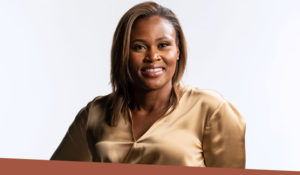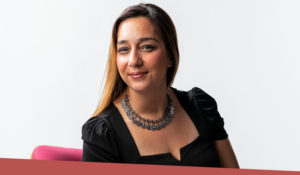MyVU is spotlighting a select group of new faculty for 2019-20. Read more profiles in the series.
By Lorena Infante Lara
Houra Merrikh distinctly remembers the day the email showed up in her inbox. Sent from the Bill and Melinda Gates Foundation (BMGF), it was an invitation to present her research to someone named “Bill”—no last name included—in two days’ time. When she showed up at the indicated hour and place, she confirmed that her audience was not, as a colleague had joked, “Bill from Accounting.”
“It was Bill Gates! The guy is brilliant. During my presentation, he asked me very specific biological questions about a topic that’s not his area of expertise,” says Merrikh, who at the time was an assistant professor at the University of Washington in Seattle.
The Merrikh Lab focuses on two main areas of research. The first is the effect that collisions between DNA replication and transcription machineries have on the life of a cell. The second topic is the one that caught the eye of the Infectious Disease Research Institute at BMGF: Merrikh believes she has found a way to drastically reduce the ability of bacteria to develop resistance to antibiotics.
Meeting with Bill Gates and his team of experts in antimicrobial resistance led to a relationship between Merrikh and the foundation, which continues to fund her research on this topic.
“Going from the back of a fast food restaurant to meeting Bill Gates—that’s a pretty steep trajectory,” she says, referring to the several minimum wage jobs she worked to support herself and pay for college.
“Going from the back of a fast food restaurant to meeting Bill Gates—that’s a pretty steep trajectory.”
Merrikh’s academic journey started in her birthplace of Iran and led her to the U.S. by way of Turkey and Northern Cyprus. Although her family also had applied for green cards to come to the U.S., complicated circumstances meant that she had to make the trip alone when she was 16. Arriving in Texas with no money, she secured housing with a family she had met briefly in Turkey and began working fast food jobs.
Merrikh took classes at a nearby community college before eventually transferring to the University of Houston, where she obtained a bachelor’s in biophysical and biochemical sciences. She later earned her Ph.D. in molecular and cell biology at Brandeis University and was soon running her own lab at the University of Washington after two years as a National Institutes of Health postdoctoral fellow at MIT.
In 2018 Merrikh was invited to give a Frontiers in Biochemistry talk at Vanderbilt. Although the talk was not meant to be a job audition, the high quality and impact of her research enthralled the audience, and she became an impromptu faculty candidate.
“I’m enjoying my time at Vanderbilt very much,” says Merrikh, who joined the Department of Biochemistry in January 2019. “The resources, diversity and innovative vision carried out by the administration have rejuvenated my scientific creativity.”
More News from Vanderbilt





